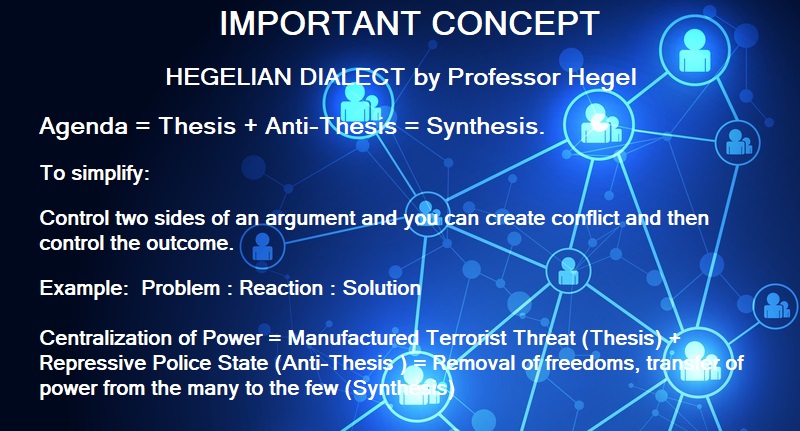Hegelian Dialect
Problem : Reaction : Solution

America’s Secret Establishment: An Introduction to the Order of Skull and Bones (2004), Page 2.
The State is Absolute
How can there exist a common objective when members are apparently acting in opposition to one another?
Probably the most difficult task in this work will be to get across to the reader what is really an elementary observation: that the objective of The Order is neither “left” nor “right.” “Left” and “Right” are artificial devices to bring about change, and the extremes of political left and political right are vital elements in a process of controlled change.
The answer to this seeming political puzzle lies in Helegian logic. Remember that both Marx and Hitler, the extremes “left” and “right” presented as textbook enemies, evoloved out of the same philosophical system: Hegelianism. That brings screams of intellectual anguish from Marxists and Nazis, but is well known to any student of political systems.
The dialectical process did not originate with Marx as Marxists claim, but iwth Fichte and Hegel in late 18th and early 19th century Germany. In the dialectical process a clash of opposites brings about a synthesis.
For example, a clash of political left and political right brings about another political system, a synthesis of the two, neither left nor right. This conflict of opposites is essential to bring about change. Today this process can be identified in the literature of the Trilateral Commission where “change” is promoted and “conflict management” is termed the means to bring about change.
In the Hegelian system conflict is essential. Furthermore, for Hegel and systems based on Hegel, the State is absolute. The State requires complete obedience from the individual citizen. An individual does not exist for himself in these so-called organic systems but only to perform a role in the operation of the State. He finds freedom only in obedience to the State. There was no freedom in Hitler’s Germany, there is no freedom for the individual under Marxism, neither wil there be in the New World Order. And if it sounds like George Orwell’s 1984 - it is.
In beief, the State is supreme and conflict is used to being about the ideal society. Individuals find freedom in obedience to the rulers.
So who or what is the State? Obviously it’s a self-appointed elite. It is interesting that Fichte, who developed these ideas before Hegel, was a freemason, almost certainly Illuminati, and certainly was promoted by the Illiminati. For example, John Wolfgang Goethe (Abaris in the Illuminati code) pushed Fichte for an appointment at Jena University.
Furthermore, the Illuminati principle that the end justifies the means, a principle that Quigley scores as immoral and used by both The Group and The Order, is rooted in Hegel. Even the anonymous Yale student who wrote the verse in Memorandum Three observed this principle at work on the Yale campus.”
This, then, is a vital part of our explanation of The Order (aka Skull and Bones or Brotherhood of Death). When its co-founder, William Russell, was in Germany, in 1831-2, there was no way he could have avoided Hegelian theory and discussion. It was the talk of the campus. It swept intellectual Germany like a Pac Man craze. Most American’s haven’t heard of it. And those who have don’t want to hear any more about it. Why ? Because its assumptions are completely at Variance with our sense of individual, not vice versa.
It’s interesting to note Hegel’s insistence in his students developing their spirituality … “Finally, Hegel’s pedagogic agenda emphasized that the aim of speculative philosophy was to remind men of the religious dimension of their nature. For Hegel, grounding human nature in religion enabled him to show men that they were spiritual beings rather than “merely” natural ones. As such beings, so went Hegel’s argument, men could “consider and grasp” what was divine about themselves. And then, by rising “about the [petty] interests of the hour,” they could “come to” themselves as selves, as “persons” who, according to Hegel, were now in a position to establish “the Kingdom of God” on earth. Since “man is spirit,” Hegel declared, “he should and must deem himself worthy of the highest; he cannot think highly enough of the greatness and power of his spirit.” For that reason Hegel concluded, “faith in the power of the spirit is the first condition of philosophizing”.[7,p307]
[1] - America’s Secret Establishment: An Introduction to the Order of Skull and Bones (2004)
[2] - FYi - Wiki - Georg Wilhelm Friedrich Hegel
[3] - Endtimes.com - Prof. Hegel - Freemason ref.
[4] - Marxists.org - Hegel - Masonic Circles ref.
[5] - Phenomenology of Spirit by Prof. G W F Hegel
[6] - Winterwatch.net - A Deep Dive into New Underworld Order Hegelian Dialectic With Antony Sutton
[7] - Book - The Cambridge companion to Hegel (1993)



Comments